
# Running
Green marathons
How green can a marathon be? Runners and organisers follow sporty and sustainable goals
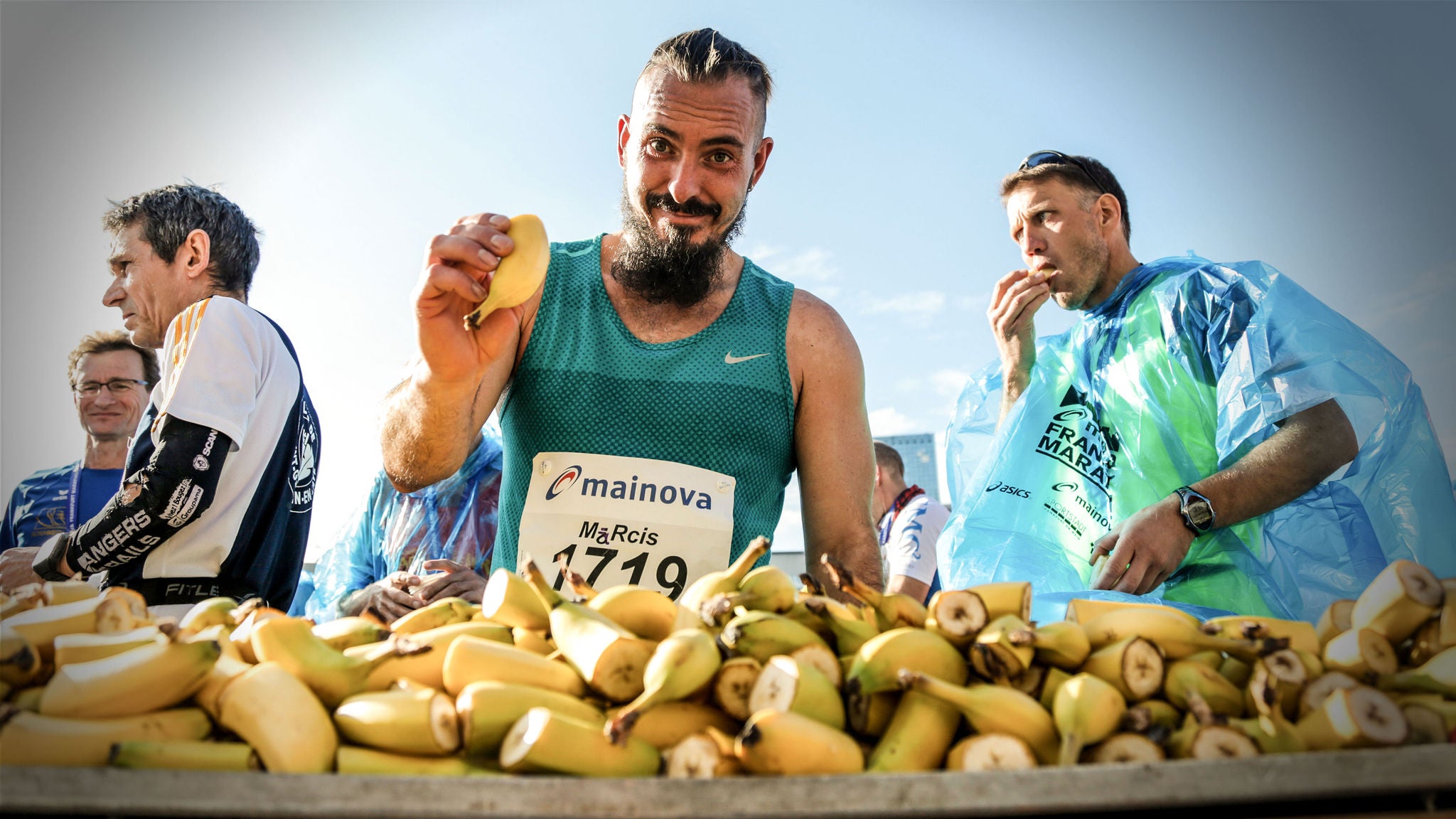
More and more marathon organisers are showing their concern for the environment by running greener and more sustainable events. They are banning plastic, using solar energy, and helping improve the lives of disadvantaged children. Read on to learn more about ten trailblazers who are racing to shrink the footprint of their marathons.
Mainova Frankfurt Marathon
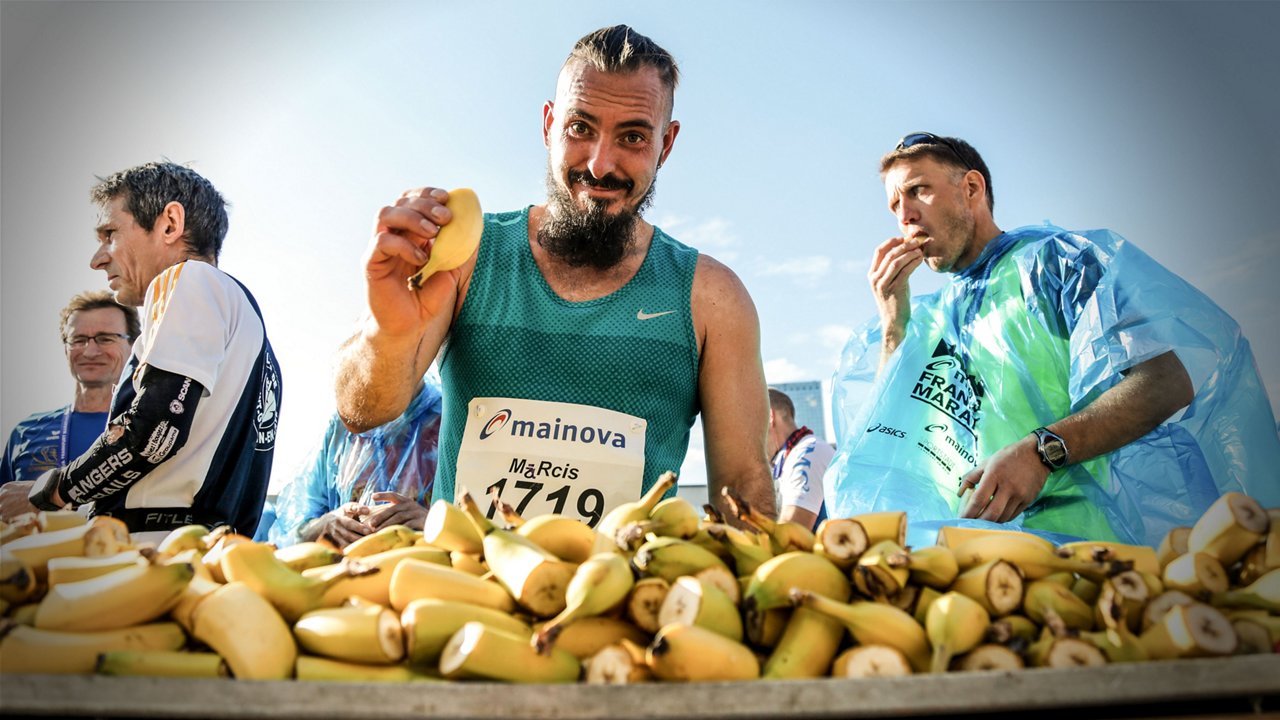 Going bananas? That’s right – for organic produce! At the Frankfurt Marathon, the catering companies stick to organic. Photo: Mainova Frankfurt Marathon
Going bananas? That’s right – for organic produce! At the Frankfurt Marathon, the catering companies stick to organic. Photo: Mainova Frankfurt Marathon
The Frankfurt Marathon has already earned its stripes as an especially sustainable race. Held in the heart of Germany’s main financial centre, since 2005 the event has been hosted in cooperation with the Rhine-Main Environmental Forum (Umweltforum Rhein-Main). In 2014 this classic race received the Green Award for the most environmentally friendly marathon – and with each passing year, it just keeps getting greener. The event’s holistic approach to shrinking each runner’s carbon footprint encompasses transportation, food services, and waste removal. On the day of the race, runners and helpers can use the buses and trains of the city’s public transportation network free of charge. The diesel generators that are used to heat the water for the shower area have long since been replaced by a system that uses warm water from the convention centre. And eleven photovoltaic units on the roofs of Frankfurt’s buildings deliver green electricity. The participant’s t-shirts are made of recycled materials, with each shirt made from around twelve recycled plastic bottles. Locally sourced organic food is served, which means fewer emissions generated through production and transportation. 100% of the recyclable waste generated by the event is collected and processed. In addition, the official lead and pace cars are all electric vehicles. And in 2018, the organisers donated €1 per runner to its partner and pasta party host, Fattoria La Vialla, which used the money to plant 4,500 olive trees in Tuscany.
Yangyuan-Six Walnuts Hengshui Lake International Marathon
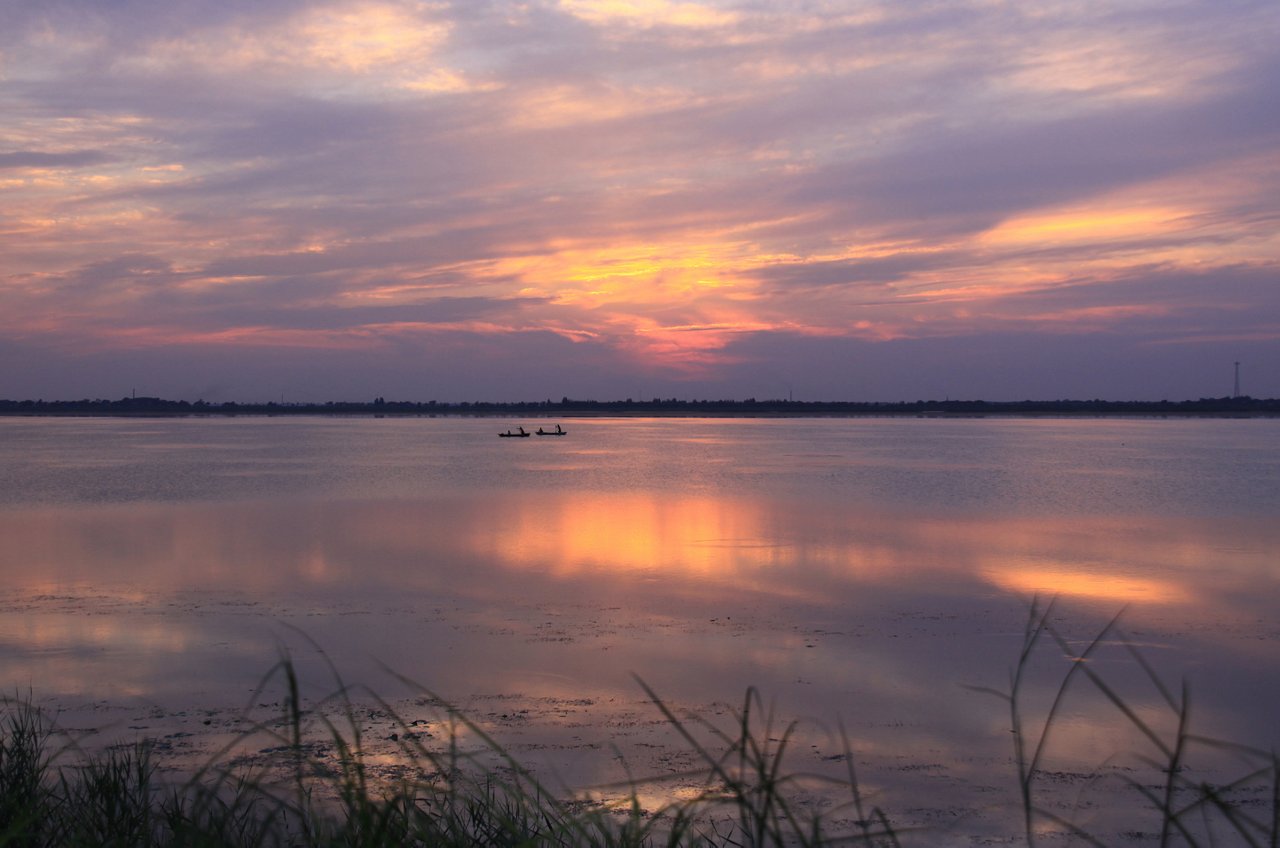 Hengshui Lake – it’s not just for the birds. Photo: 阿留申 / Aliu shen
Hengshui Lake – it’s not just for the birds. Photo: 阿留申 / Aliu shen
“Green Marathon, Beautiful Hengshui Lake” was the slogan of the 2018 Yangyuan-Six Walnuts Hengshui Lake International Marathon. And this race held in Hengshui, a city located in China’s Hebei province to the south of Beijing, probably wins the prize for the longest marathon name. But how green is it? The route alone shows its dedication to nature – almost the entire course runs along the shores of Hengshui Lake. The organiser’s main focus is on preserving the habitat of the many rare bird species who have settled in these wetlands. This message is communicated effectively on a “wish board,” helping the race organisers support the local government, which has undertaken a series of measures to improve the region’s environment – like creating a new local green space covering 1.3 square kilometres. And to keep the area pristine, teams are deployed during the marathon to clean up all waste. So even though some 18,000 runners take part in the race, by the next day you can’t even tell they were there!
Hartford Marathon
New York City, Boston... Hartford? If you’ve already checked America’s most venerable marathons off your list, you should turn your steps toward the capital city of Connecticut, which is located halfway between the cities that host the two granddaddies of marathons. In Hartford you’ll not only find the former residence of author Mark Twain, creator of such beloved characters as Tom Sawyer and Huckleberry Finn, but a particularly green marathon as well. As early as 2007 the marathon organisers introduced the “bubbler,” a twelve metre long water pipe with multiple spouts, to allow the athletes to drink without cups. Organisers say that to date, this innovation has eliminated the need for some 85,000 plastic cups. Energy is provided by the Solar Trailer, a bus equipped with photovoltaic panels. And since 2013, the Hartford Marathon has been partnering with the Eco Husky Club, a student organisation dedicated to environmental protection. The club makes sure that the waste generated during the marathon is composted – and educates runners, spectators, and helpers about how to compost at home.
Röntgenlauf Remscheid
This event is one of the largest non-urban races in Germany, taking runners along the legendary Röntgenweg, a hiking trail in the Bergisches Land mountain range. The route winds along lakes and through valleys and forests – and the organisers are committed to showing their love of nature through their particularly sustainable concept. Food is provided by local companies so it doesn’t have to be transported over long distances. And the water for the runners isn’t transported at all – the water for the drinking stations flows from local taps. The marathon doesn’t have pace cars either: bicycles are used instead. Single-use plastic items such as plastic cups and plates have been completely banned from the event. On the day of the race, participants can use public transportation as well as the event’s shuttle buses for free. And to get to Remscheid, the organisers have breathed new life into an old idea – ride sharing. The event’s website features a page where participants can sign up to share rides to and from the race. The green streak also extends to the snacks offered along the route – no packaged food is provided. You won’t even find a plastic wrapper on the obligatory granola bars, which are produced in bulk for the event by a local baker.
Black Forest Marathon
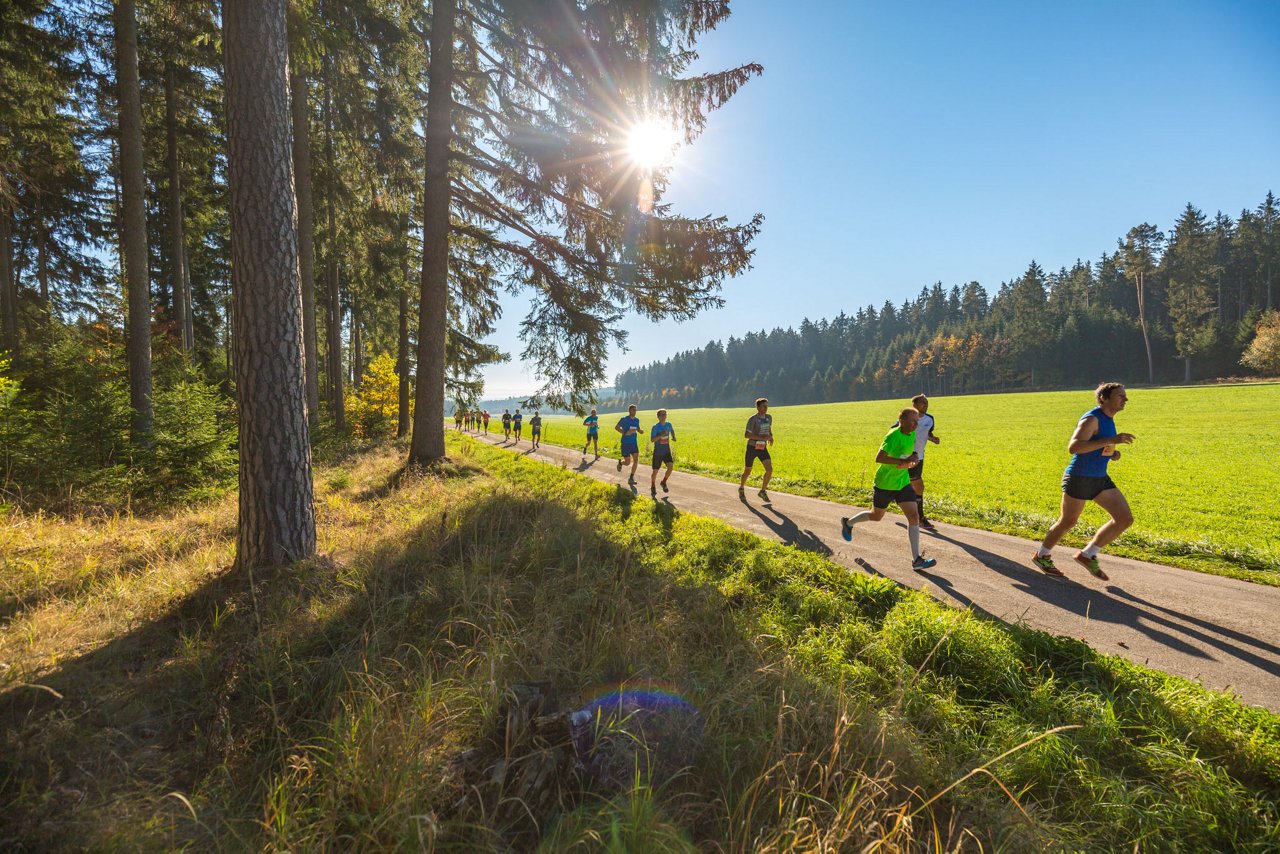 At this green marathon in the Black Forest, 80% of the course runs through the woods. Photo: Black Forest Marathon
At this green marathon in the Black Forest, 80% of the course runs through the woods. Photo: Black Forest Marathon
October 2019 marked the 52nd running of the Black Forest Marathon, whose name tells you almost everything you need to know about the race – not just its location, but about the topography as well. 80% of the race around the hamlet of Bräunlingen is run on forest trails. Not only does the marathon cover natural terrain, but the entire event shows a deep respect for nature. Plastic is gradually being phased out at the race. For example, the race pack is no longer handed out in plastic bags, but in cloth totes. This marathon is especially popular with athletes from outside Germany. At the last event, runners from 34 nations gathered at the starting line – including Mexico, the Philippines, Lebanon, Japan, Israel, Qatar, and Egypt. And although the Black Forest may be known for its eponymous cherry cake, there are also all sorts of savory snacks available on the day. Runners and spectators alike enjoy exclusively regional food – meaning shorter delivery routes and lower emissions.
Salzburg Marathon
The famed birthplace of Mozart in Austria also puts on a green event. In 2012 the Salzburg Marathon was ranked first in the country for “sport and sustainability.” In addition, it was Austria’s first run to be “organically certified” three times. The commitment to sustainability is already apparent when runners pick up their start numbers – and are welcomed with locally produced organic treats. And along the route, runners can grab apples, bananas, and oranges – organic only, of course! Even the alcohol-free beer that many participants like to enjoy after crossing the finish line comes from Paracelsus, Salzburg’s organic brewery. Gatorade gets a green upgrade here as well – the popular, electrolyte-packed beverage isn’t provided in the usual plastic bottles, but is delivered in powder form and mixed with fresh local spring water on site. Participants and spectators alike can enjoy an event that’s free of noise – at least from vehicles. The only motorised vehicles are the ambulances and the camera motorcycles belonging to national broadcaster, ORF. Marathon boss and employees, police and EMTs mostly use mountain bikes or electric bicycles to get around.
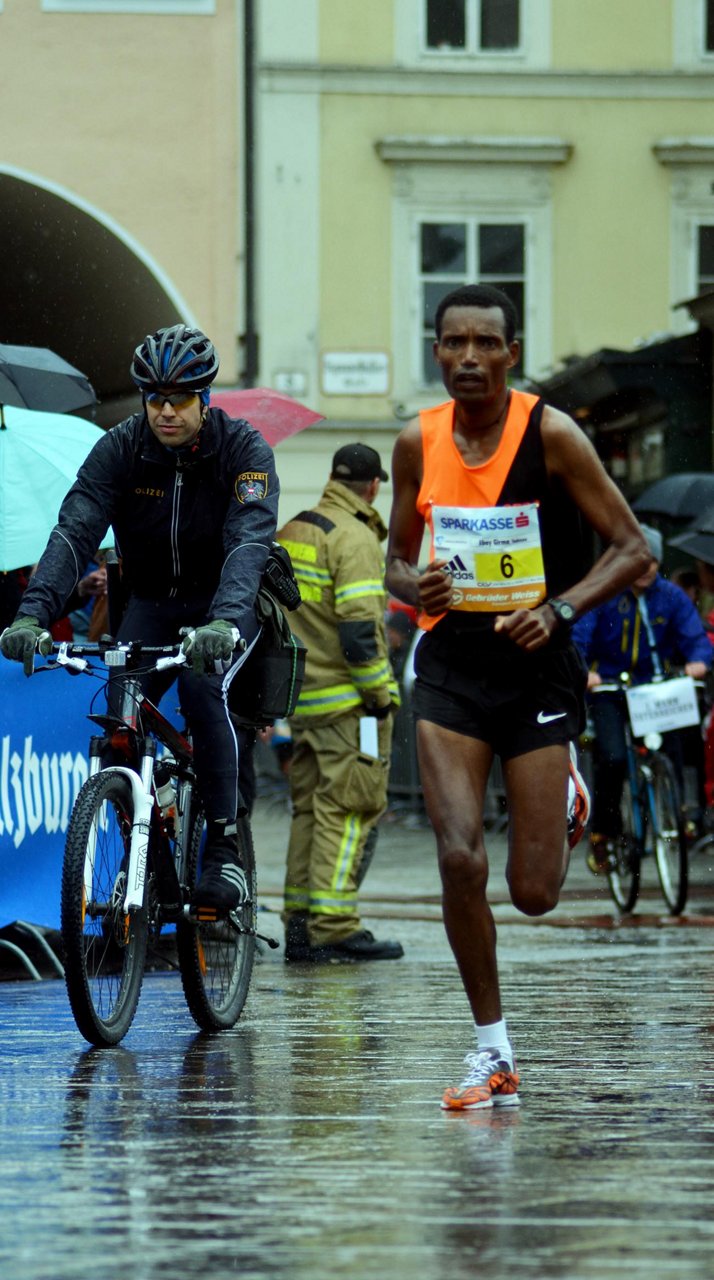 Top runner Temesgen Bekele shortly before crossing the finish line in Salzburg – accompanied by a bike-riding policeman. Even the cops travel in eco-friendly style! Photo: Buschmann
Top runner Temesgen Bekele shortly before crossing the finish line in Salzburg – accompanied by a bike-riding policeman. Even the cops travel in eco-friendly style! Photo: Buschmann
SwissCityMarathon
“You can’t exercise outdoors unless the environment is intact” say the organisers of the SwissCityMarathon in Lucerne. With this in mind, they work hard to make this marathon, which welcomes 10,000 participants, a green event. While the negative environmental outputs of the race might seem minor when compared to the annual impacts faced by the region, the organisers are also trying to look at the big picture. They work to educate the 60,000 people who attend the sporting event about environmental protection, for example by offering a platform to companies that make sustainable products. Which makes regional enterprises their top pick as partners for the event. Priority is given to companies whose products are certified to the Max Havelaar Fair Trade standard, such as fruit that meets its strict organic and labour criteria. The Swiss Runners Ticket lets runners travel to the race from anywhere in Switzerland free of charge – using public transportation, of course. Waste is avoided to the greatest extent possible, and any that is produced is sorted for recycling. The race’s Clean Teams are responsible for keeping the event litter-free around the clock. All motor vehicles are banned from the city centre, and energy is sourced from renewables. The Lucerne marathon has already been honoured three times by different environmental organisations for its attention to sustainability – it has been named an “environmental champion” and an “exemplary event” and received the prix ecosport.
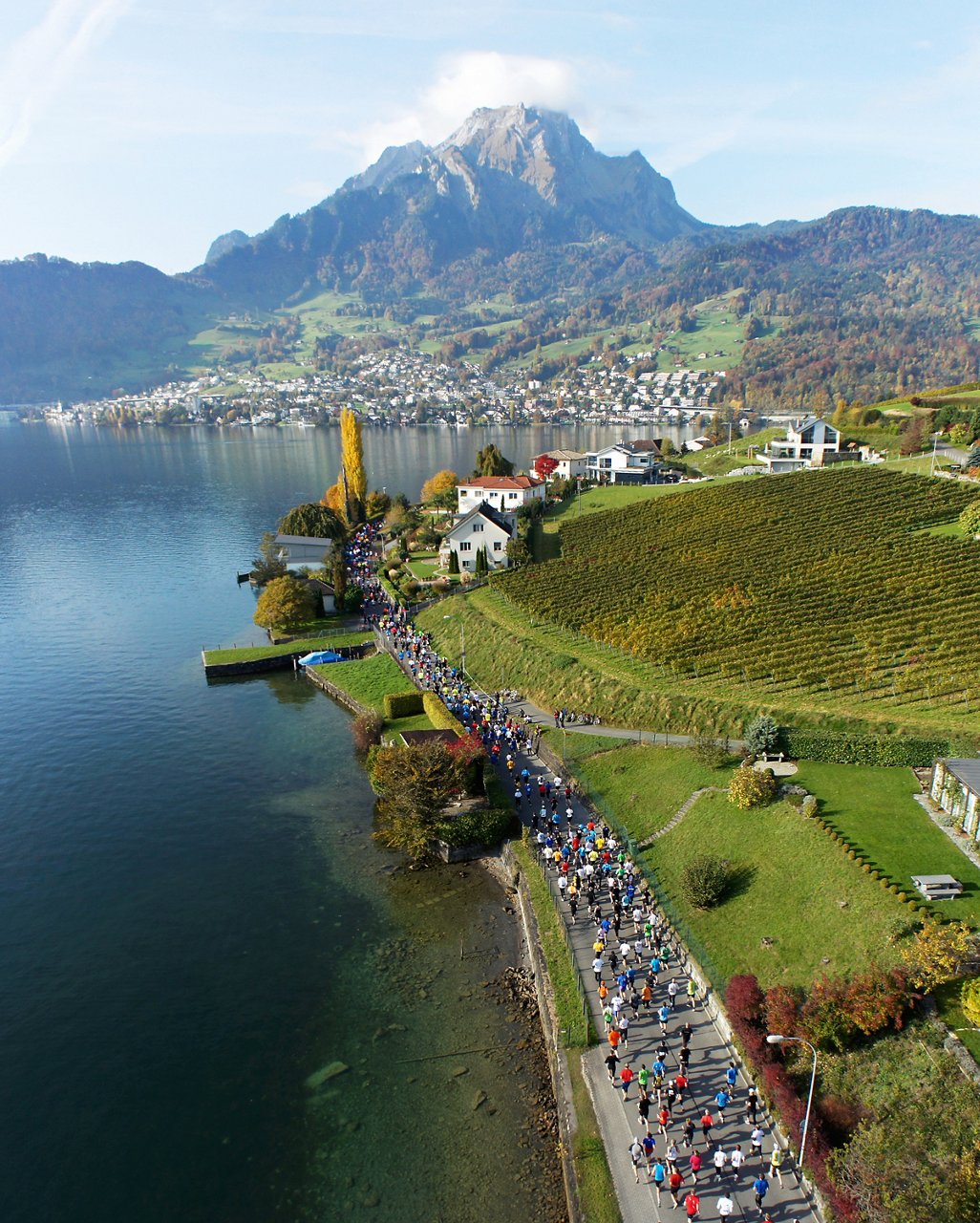 For its efforts to preserve this idyllic setting, the SwissCityMarathon’s sustainability concept has already scooped three awards. Photo: Ammon
For its efforts to preserve this idyllic setting, the SwissCityMarathon’s sustainability concept has already scooped three awards. Photo: Ammon
Brighton Marathon
After the starting gun sounds at the Brighton Marathon on England’s south coast, the runners race across the countryside, past the tourist attractions, and down to the sea. For many Britons, this seaside town in East Sussex is a popular holiday destination. And to preserve the local quality of life, the organisers adhere to strict environmental standards. They have cut down significantly on single-use plastic items, replacing them with paper-based products that are recycled after the race. In the future, the plan is that each drinking station will have water lines where the runners can refill the reusable plastic bottles provided by the organisers. Event partner, Erdinger, is getting on board and serving its beer in cups made from cornstarch. And of course, all waste is recycled. Plus the organiser is certified under the ISO 20121 standard, which was introduced in conjunction with the London Olympics in 2012 – the first global standard for sustainable event management.
Sanlam Cape Town Marathon
Set against the backdrop of Cape Town’s famed Table Mountain, this marathon not only welcomes more runners than any other in Africa, but is also known for its green credentials. Its slogan, “Run4Change,” stands for its commitment to sustainability. The Cape Town Marathon has long since recycled or composted all its waste, and its water supply concept is also revolutionary. In keeping with the principle that every drop of water counts, the marathon organisers partner with the Bluewater Africa organisation, which aims to make high-quality water available in regions of the world where this precious resource is scarce. Because eliminating the use of single-use plastic cups is also high on the organiser’s list, Bluewater provides large water tanks for marathon participants to refill their reusable bottles. The Cape Town Marathon also cooperates with charitable organisations that support causes such as educational opportunities for children, wildlife conservation, and women’s rights.
Impact Marathon Series
The Impact Marathon series isn’t about symbolic actions, but rather creating genuine change in direct cooperation with the participants. The concept is exciting – the athletes travel to locations off the beaten track and spend a week working on grassroots development projects. At the end of the week, they run a marathon together. In a small village in Nepal, for example, the group pitched in to build a five kilometer long water pipeline before running their race on the Saturday. Other events in the series are held in Guatemala, Kenya, and Malawi. At the end of May 2019, the next Impact marathon will be held on the banks of Lake Malawi. The runners will spend the week before the race helping with projects that benefit disadvantaged children. “What we do changes lives forever,” say the organisers.
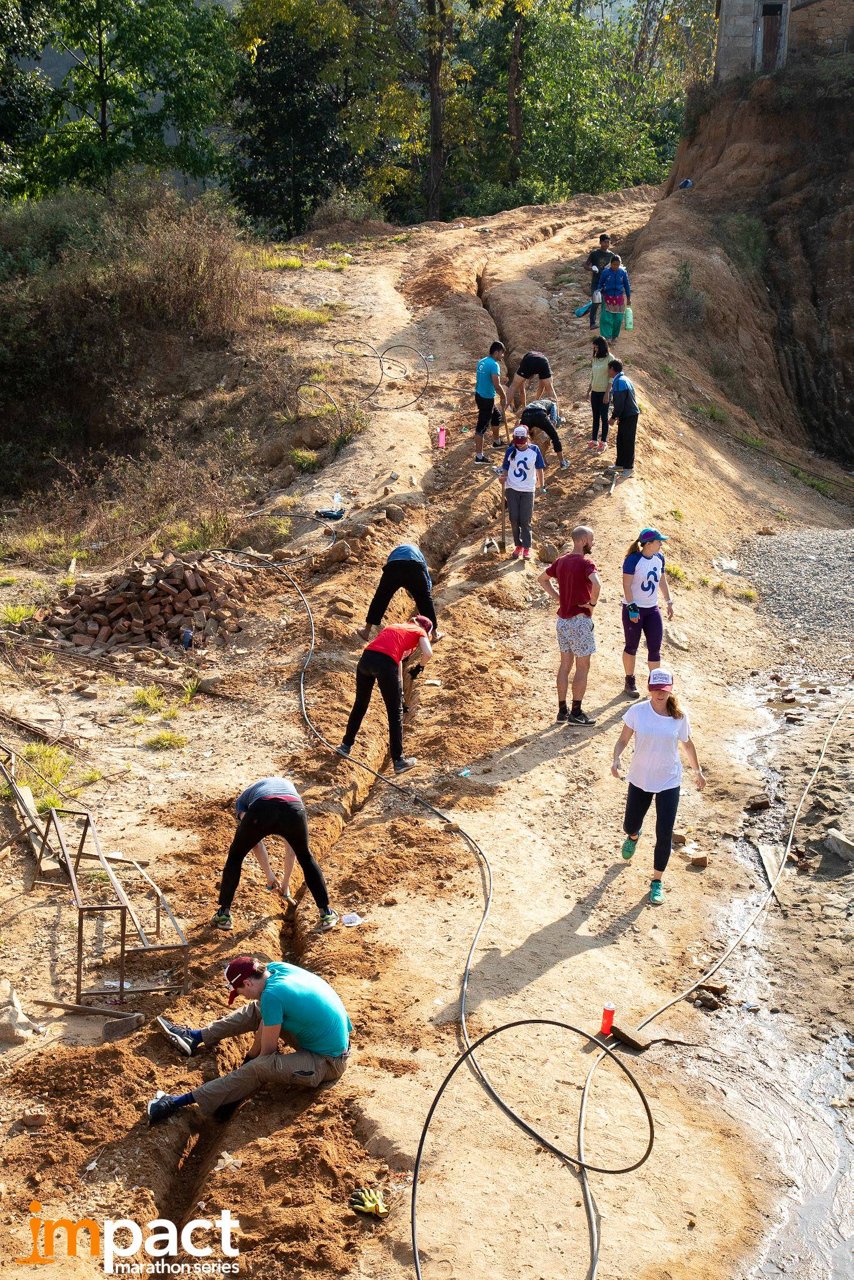 In Nepal, the week before the marathon was tough but extremely rewarding. The runners joined forces to construct a water filtration unit and pipeline that will supply the entire village with clean drinking water. Photo: Adam Dickens
In Nepal, the week before the marathon was tough but extremely rewarding. The runners joined forces to construct a water filtration unit and pipeline that will supply the entire village with clean drinking water. Photo: Adam Dickens
